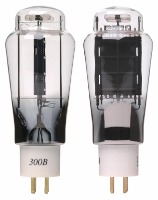ACDC Audio technical
Silver Wire in Audio

… using silver wire in audio, or not ?
There are a lot of urban legends to find on audio fanatics forums. One of the most redundant ones is about using silver wire in audio amplifiers.
Of course, the metal intrinsic resistance has an effect on wire resistance. But let’s be practical : does it really matter when it comes to amplifiers’ inner wiring?
The resistance of a wire can be calculated :

where l is the length of the conductor, measured in metres [m], A is the cross-sectional area of the conductor measured in square metres [m²], and ? (rho) is the electrical resistivity of the material, measured in ohm-meters (Om). Resistivity is a measure of the material’s ability to oppose electric current.
Wires in an amplifier are very rarely exceeding 30 cm. A copper wire (? = 16.8 nanoOm) of 1mm diameter and 30 cm length, exhibits a resistance of 5.04 milliOhms. The same wire, made in silver, will exhibit a resistance of 4.77 milliOhms, a difference of 0.27 milliOhms.(see also)
Is there a difference ? Yes.
Is it of any importance ? Of course it is not. Not in this application anyway. A difference of about a quarter of a thousandth of an Ohms has no effect whatsoever on the working of our beloved tube amps. We seriously doubt that it has any impact on your hearing experience (but it will have an heavy one your wallet).
On the other hand, silver (or silvered) wires are much more difficult to solder, and silver solder is also very difficult to achieve. This is often the cause of bad solder joints.
Take into account the tiny advantage of silver over copper and the huge increase of costs. Think about the technological difficulty to use silver properly. It’s then obvious that silver wire in audio amps isn’t the best solution to improve the sound. If we want to increase the overall quality of an amplifier, the effort would be far more rewarding using better capacitors, or better tubes than using silver wire in audio.
That’s why, at ACDC-audio, we only use high quality multi stranded 99.99 grade copper wires.